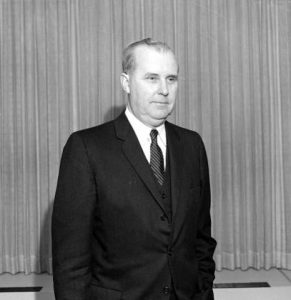
Photo info ...
Credit: W.H. Bass Photo Company Collection, Indiana Historical SocietyView Source
(Oct. 17, 1904-Sept. 8, 1982). Born in Paulding, Ohio, Harry T. Ice moved to Indianapolis in 1918 and graduated from . He attended , graduating in 1926, and earned his law degree at Harvard University. After passing the bar in 1929, he joined Henley Matson and Gates, founded in 1910 and led by prominent Indiana attorney Frederick Matson. Ice became a partner in 1934. He served in the U.S. Navy during World War II, which was the only time he spent away from the law firm.
At a time when most attorneys were generalists, Ice supported the idea of specialization in the law. With the vast amount of information accumulated in the legal profession, he believed that attorneys should become well-versed in particular fields to better serve their clients. His progressive thinking has been held up by successive partners as one of the reasons for the firm’s longevity and prosperity.
The law firm became known as Ross McCord Ice and Miller in 1942 after Frederick Matson retired. In the early 1950s, the firm was instrumental in the founding of the (ICLU). Ice was known as “a man of honesty and integrity” and as a “lawyer’s lawyer.” He allowed firm attorneys Merle Miller and to act on their convictions to help establish the ICLU, despite the controversy surrounding it. At the time, many believed that the American Civil Liberties Union and its local affiliates were connected to communism.
Ice was the confidant of many Indiana governors, Indianapolis mayors, and businessmen. When a large project needed financing, community leaders sought his opinion. Ross McCord Ice and Miller served as approving counsel for bonds for the Indiana Toll Road and the .
The name of the firm changed to Ice Miller Donadio and Ryan in 1963. The firm was recognized in major financial markets as a leading bond counselor and for the City of Indianapolis again served as approving counsel for the bonds for .
Ice was also involved in legislation that brought dramatic change to Indianapolis, including for schools, sewers, hospitals, and public safety. In 1972, he served as special counsel to the Indiana attorney general in the successful defense of the state financing plan for public schools against a lawsuit challenging its constitutionality.
Ice served on the board of many local, state, and national businesses, organizations, and philanthropic concerns. He was vice president of the United States Chamber of Commerce (1937-1938), trustee of the Indiana State Reformatory at Pendleton (1939-1942), trustee of the Boys School at Plainfield (1945-1949), and president of (1950-1952). Directorships included the Associated Colleges in Indiana, of Greater Indianapolis, (GIPC), Crossroads of America Council of , , Indiana Chamber of Commerce, and Indianapolis . He was a member of the Constitutional Revision Commission, Indiana Commission on Higher Education, Commission on State Taxation and Financing Policy, and chairman of the Indiana Ethics and Conflicts of Interests Commission.
Ice remained a partner of Ice Miller Donadio and Ryan at the time of his death in 1982. The firm retained Ice’s name when it became Ice Miller LLP in 2000. It remains one of the largest law firms in Indianapolis and one of the 200 largest firms in the U.S.

Help improve this entry
Contribute information, offer corrections, suggest images.
You can also recommend new entries related to this topic.